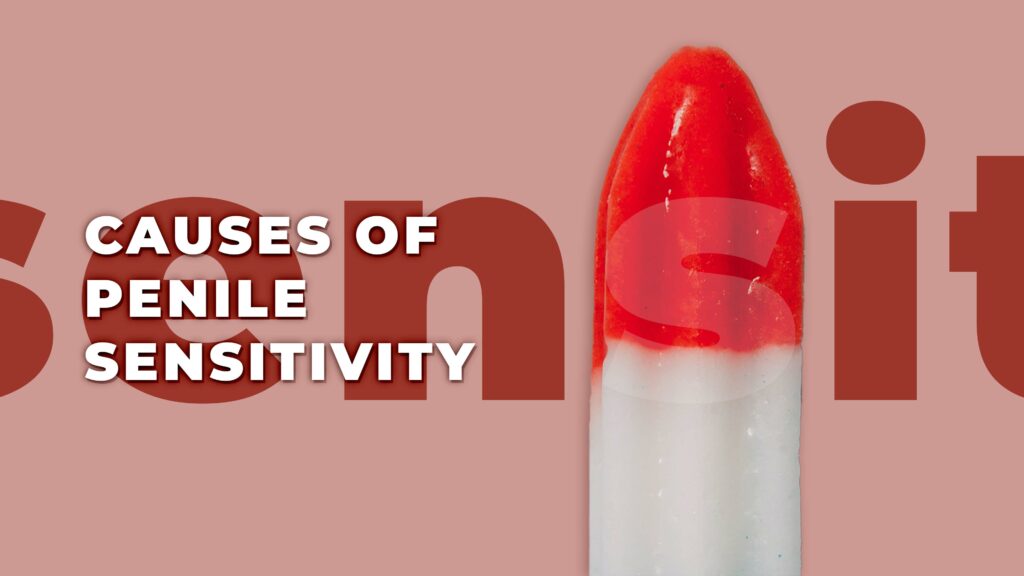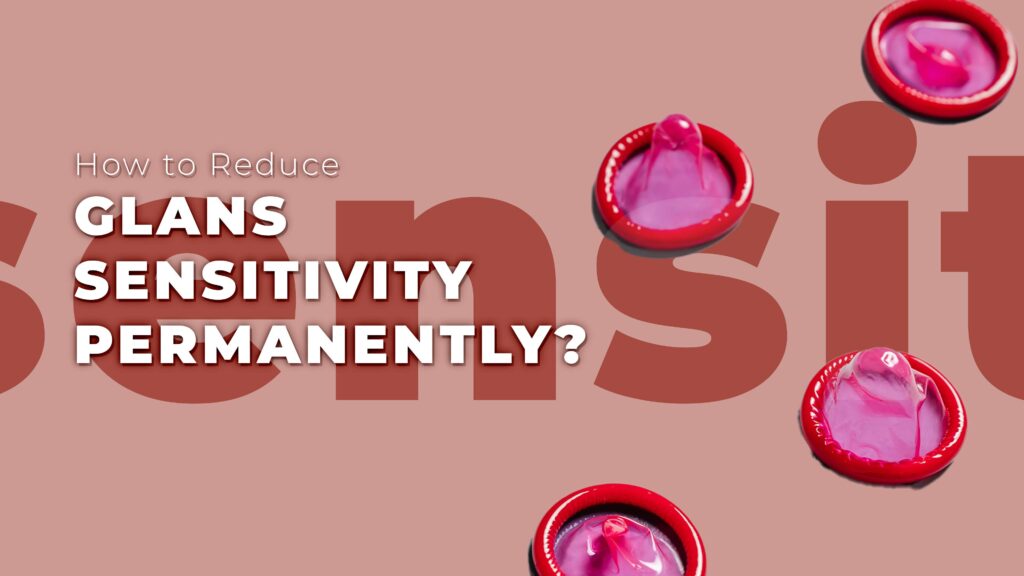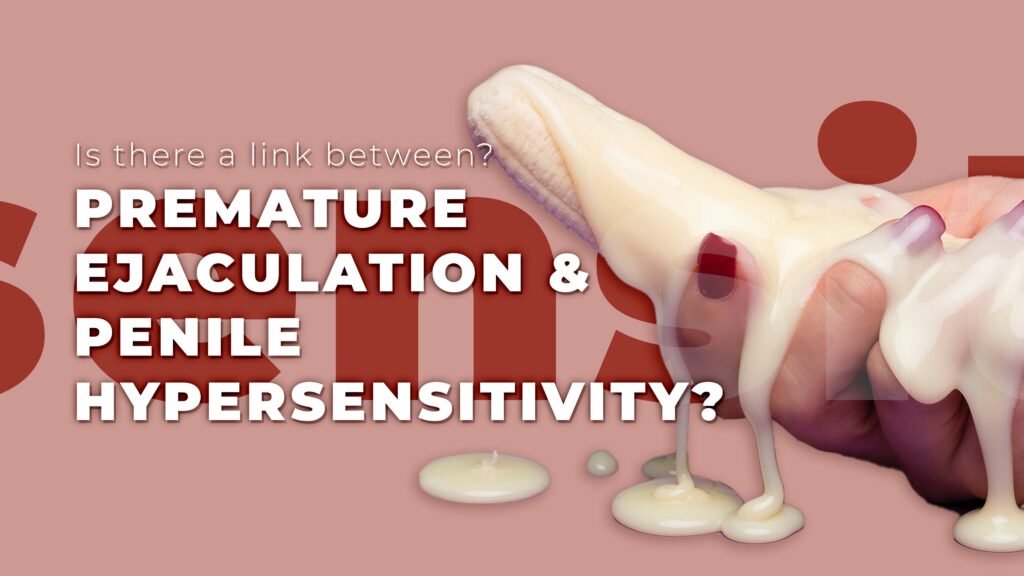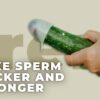For arousal and getting an erection, penile sensitivity is important to some extent. But having a hypersensitive penis can be embarrassing and uncomfortable. Heightened penile sensitivity can cause problems like premature ejaculation, impacting your sexual confidence.
Penis sensitivity is an issue many men suffer from, but it doesn’t have to be a permanent problem. There are ways to reduce penis sensitivity and gain back your sexual confidence. In this blog, we will talk about why the penis is sensitive, what signs show it, possible treatments. We will also discuss ways to decrease penile sensitivity for more sexual confidence.
Contents
- 1 Understanding Penile Sensitivity
- 2 Common Causes of Penile Sensitivity
- 3 Symptoms of High Penile Sensitivity
- 4 Do Uncircumcised Men Experience More Sensitivity Than Circumcised Men?
- 5 Loss of Penile Sensitivity With Age
- 6 Impact of High Penile Sensitivity on Sexual Health
- 7 Natural Ways to Decrease Penile Sensitivity
- 8 How To Reduce Glans Sensitivity Permanently?
- 9 Is There A Link Between Premature Ejaculation and Penile Hypersensitivity?
- 10 Tips for Maintaining Penile Health and Other Ways to Last Longer in Bed
- 11 The Final Thought
Understanding Penile Sensitivity
Penis sensitivity is how sensitive or responsive the penis is to sexual stimulation. The sensitive areas of a penis include:
- Glans (head of the penis)
- Frenulum (where the head meets the shaft)
Penile Sensitivity plays a crucial role in sexual pleasure and sexual health. Even a gentle touch or rubbing can cause quicker orgasm for a sensitive penis. But, decreased sensitivity can result in difficulties in achieving sexual satisfaction.
So, what causes penis sensitivity? Various factors can contribute to high penile sensitivity, including physical and psychological factors. For example, certain medical conditions like balanitis can increase sensitivity. Other factors may include psychological stress, anxiety, or past traumatic experiences.
Now, why is it important to understand penis sensitivity? This is because it helps people find why they feel uncomfortable and take the right actions to fix it. Understanding the factors causing hypersensitivity can help people explore methods to reduce it. Moreover, decreasing penile sensitivity can have several benefits. This includes enhanced control over ejaculation and increased sexual confidence.
Further, we will discuss the common causes of penile sensitivity and its symptoms.
Common Causes of Penile Sensitivity

Both physical and psychological factors influence penile sensitivity. Most common among them is the presence of a skin condition called balanitis. It is a condition that leads to inflammation of the foreskin or head of the penis. Hence, resulting in heightened sensitivity and discomfort during sexual activity. Another potential cause is excessive masturbation or rough handling of the penis. This can lead to increased sensitivity due to constant stimulation.
Psychological factors can also contribute to penile sensitivity. These factors include stress, anxiety, and past traumatic experiences. They can affect the brain’s perception of pleasure. Finally, resulting in heightened sensations and quicker ejaculation.
Some other possible causes for penis sensitivity are:
- Phimosis
Uncircumcised men are susceptible to Phimosis[1]. The foreskin is tight and cannot be drawn back from the penis head in patients with this condition. - Paraphimosis
It is a condition where the foreskin gets stuck while pulling it behind the head of the penis. This condition may cause pain and swelling to the penis. - Urinary Tract Infection (UTI)
UTI is a short-term disease that is treatable with antibiotics. It can cause penile pain, particularly when peeing or ejaculating.[2] - Trauma to the penis
Penis trauma complications could be short-term or long-term. Rough sexual activity, injuries from sports, or falls can all lead to penis injuries. - Genetics
According to a study, when it comes to penile sensitivity, genetics might be important.[3] It is possible that this runs in your family if you have higher-than-normal sensitivity.
Understanding the common causes of penile sensitivity is crucial in addressing the issue. By identifying the root cause, you can take steps to reduce sensitivity. This will further help you regain control over your sexual experiences. From medications to relaxation exercises, you can try various methods to decrease sensitivity.
Symptoms of High Penile Sensitivity
High penile sensitivity can manifest in various symptoms. These symptoms might impact your sexual experiences. Here are some common symptoms to look out for:
- Quick and uncontrollable ejaculation
The most common symptom is the inability to control ejaculation. Even the slightest stimulation can lead to a rapid release. This can be frustrating for both you and your partner. - Increased discomfort during sexual activity
Men with high penile sensitivity may feel discomfort or pain during sexual activity. This can make it difficult to enjoy the experience and may even lead to a decrease in sexual desire. - Difficulty in maintaining an erection
Heightened penile sensitivity can also affect your ability to maintain an erection. The increased sensitivity can make it challenging to stay aroused. It can also lead to erectile dysfunction. - Emotional distress and decreased sexual confidence
Dealing with high penile sensitivity can take a toll on your emotional well-being. It can lead to feelings of frustration, embarrassment. Also, it might result in a decrease in sexual confidence.
Identify these symptoms and learn various methods available to decrease sensitivity. Don’t let high penile sensitivity hold you back from enjoying a fulfilling sex life.
Also read: Painful Erections: Everything You Should Know
Do Uncircumcised Men Experience More Sensitivity Than Circumcised Men?
Impact of circumcision on penile sensitivity has led to a huge debate in the medical field. The foreskin is not the most delicate or sensitive part of the penis. Some individuals speculate that uncircumcised males may be more sensitive than circumcised men. Yet, current studies do not support this theory. They were against the fact that circumcision reduces penis sensitivity.
Master and Johnson did an early study on circumcision and sensitivity in 1966.[5] They found uncircumcised and circumcised men can feel touch on both sides of the penis.
Yet, more recent research points to different findings. Another study found that the foreskin of intact males is more sensitive to touch. It also examined how touch and temperature sensitivity varies in circumcised and uncircumcised men.
The relationship between circumcision and penile sensitivity is still unclear. More research is necessary to clarify it.
Loss of Penile Sensitivity With Age
Loss of penile sensitivity is a common concern among men as they age. As men get older, it is natural for them to experience changes in their sexual health and function. One of these changes may be a decrease in penile sensitivity.
The loss of penile sensitivity with age can have various causes. One possible explanation is a decrease in the production of hormones. Hormones such as testosterone, can affect sexual desire and sensitivity. Additionally, reduced blood flow to the penis can also contribute to decreased sensitivity.
Also read: At What Age Does A Man Stop Ejaculating
While the loss of penile sensitivity with age may be disheartening for some men, but it is a normal part of aging. Yet, there are ways to address this issue and maintain a satisfying sex life.
Increasing penile sensitivity can have its benefits. But it is important to understand the individual’s needs and preferences. Some men may find that reducing sensitivity improves their sexual experiences. Others may find that increasing sensitivity is more beneficial for them.
Impact of High Penile Sensitivity on Sexual Health
High penile sensitivity can have a significant impact on your sexual health. Hypersensitive penis can lead to issues that can affect your sexual experiences. For instance, it can result in quick and uncontrollable ejaculation. Hence, making it difficult to enjoy and prolong sexual activity. This can leave you and your partner feeling unsatisfied and frustrated.
High penile sensitivity can cause discomfort or even pain during sexual activity. It might hinder your ability to engage in pleasurable experiences. It can also contribute to difficulty in maintaining an erection, leading to ED. Facing these challenges can cause emotional distress and a loss of sexual confidence.
Natural Ways to Decrease Penile Sensitivity
Are you struggling with high penile sensitivity? Look no further for natural ways to decrease it! Here are several methods you can try:
The “Squeeze” Technique
To delay ejaculation, use your thumb and index finger to apply pressure below the head of the penis. This can help delay orgasm and decrease penile sensitivity.
Edging
Edging is a technique where you bring yourself close to orgasm. You stop and take a break before starting again. This can help decrease penile sensitivity and improve control over ejaculation.
Mindfulness And Relaxation Techniques
Stress and anxiety can increase sensitivity and make it harder to control ejaculation. Practicing relaxation techniques can help decrease penile sensitivity and improve control. Relaxation techniques include deep breathing, meditation, and yoga.
Take breaks during sexual activity. Focusing on pleasuring your partner through other means. You can try oral sex or manual stimulation. This will help reduce sensitivity and prolong sexual pleasure.
Everyone is different, so it may take some trial and error to find the method that works best for you. The key is to be patient and open-minded. Communicate with your partner about your desires and concerns. Decreasing penile sensitivity can have many benefits. These include increased sexual confidence, longer-lasting pleasure, and a more fulfilling sex life.
How To Reduce Glans Sensitivity Permanently?

Consult your doctor first to make sure there are no hidden medical problems. There are a few things that may help decrease penile sensitivity:
- Use a desensitising spray or cream
These products contain a mild anasthetic. They can help reduce sensitivity and improve endurance. - Use a thicker condom
Condoms can reduce sensitivity and help prolong ejaculation. - Utilize oral medications
Selective serotonin reuptake inhibitors (SSRIs) is a class of antidepressants. It might be an option for you based on the underlying cause of your penile hypersensitivity. SSRIs were originally created to treat mood disorders. But they are occasionally used off-label to treat premature ejaculation. Dapoxetine Tablets, Super P Force Tablets, Super Kamagra, and Tadapox Tablets are a few of them.
Penile sensitivity can vary from person to person. What works for one person may not work for another. Consult a doctor before trying any techniques or products to decrease penile sensitivity.
Is There A Link Between Premature Ejaculation and Penile Hypersensitivity?

Premature ejaculation is a common concern for many men. It occurs when a man reaches climax sooner than he would prefer. Most men take approximately 4-7 minutes to ejaculate during intercourse. You’re normal if you’re in that range.[6]
PE is often linked to high penile sensitivity. Even the slightest touch to a hypersensitive penis can trigger an intense sexual response. Hence, leading to a quick and uncontrollable release. This can be frustrating for both you and your partner. As it may prevent you from enjoying and prolonging sexual activity.
According to studies, a hypersensitive penis has a link with inability to control orgasm. Researchers studied 420 men. They found that those with mild or severe PE had hypersensitivity in their glans and shafts.
It is important to understand how penile sensitivity is connected to PE. This understanding helps in addressing and overcoming these problems. By decreasing penile sensitivity, you can gain better control over your arousal levels. It will further help prolong your sexual experiences. Hence, reducing the occurrence of premature ejaculation.
Not all studies have found a link between penile hypersensitivity and PE.[8] Although some evidence implies one exists. Researchers used a vibrometer to test penile sensitivity in a study. They found no significant difference between men with and without PE.
The sample size for that study was 33 men. Hence, the size of the study was not big enough to catch the impacts. For some men, PE might stem from hypersensitivity. For others, it might be more related to the brain’s chemistry and neurotransmitters.
Experimenting with different methods can help you overcome PE. You can try reducing or increasing sensitivity. The key is to find the balance that works best for you and your partner.
Tips for Maintaining Penile Health and Other Ways to Last Longer in Bed
When it comes to maintaining penile health there are several tips and strategies you can try. Practising good hygiene is essential for keeping your penis clean. It will keep your penis free from infections or irritations. Be sure to wash your penis with mild soap and warm water every day. Using a moisturiser or specialised cream might help you keep the skin hydrated. It will also prevent dryness or chafing.
Regular exercise is crucial for maintaining a healthy and functional penis. Engaging in cardiovascular exercises can improve blood circulation. You can try running or swimming. Pelvic floor exercises are also known as Kegels. They can strengthen the muscles that control ejaculation. Kegels will also help you to have better control over your sexual experiences.
Also read: 7 Exercises for Premature Ejaculation: Boost Your Stamina
Experimenting with different levels of sensitivity might contribute to better sexual experiences. For some men, decreasing sensitivity can help prolong sexual pleasure and prevent PE. But, for some, increasing sensitivity can enhance arousal levels and improve sexual satisfaction.
Everyone is different, so it’s essential to explore and find what works best for you. By incorporating these tips into your routine, you can maintain penile health. These tips might improve your sexual performance as well.
The Final Thought
Penile sensitivity refers to the level of sensitivity of the penis to touch and pressure. Sensitivity can vary from person to person. Various factors, including age, health, and personal experiences can affect penile sensitivity.
The penis is most sensitive at the glans and the areas around the frenulum. Frenulum is a thin strip of tissue connecting the glans to the shaft. The sensitivity of the penis can affect a person’s sexual pleasure. Moreover, it can also impact the person’s ability to achieve an orgasm.
Some people might experience decreased penile sensitivity over time. Others might have lower sensitivity. Sometimes, people may wish to decrease penile sensitivity or increase it. It all depends on their individual preferences and needs. Some techniques and products might help achieve these goals. But consulting a doctor before trying new techniques or products is essential.
References
- McPhee AS, Stormont G, McKay AC. Phimosis. [Updated 2022 Aug 8]. In: StatPearls [Internet]. Treasure Island (FL): StatPearls Publishing; 2022 Jan-.https://www.ncbi.nlm.nih.gov/books/NBK525972/
- Bono MJ, Leslie SW, Reygaert WC. Urinary Tract Infection. [Updated 2022 Nov 28]. In: StatPearls [Internet]. Treasure Island (FL): StatPearls Publishing; 2022 Jan-. https://www.ncbi.nlm.nih.gov/books/NBK470195/
- Waldinger MD. Toward evidence-based genetic research on lifelong premature ejaculation: a critical evaluation of methodology. Korean J Urol. 2011 Jan;52(1):1-8. doi: 10.4111/kju.2011.52.1.1. Epub 2011 Jan 24. PMID: 21344023; PMCID: PMC3037500. https://www.ncbi.nlm.nih.gov/pmc/articles/PMC3037500/
- Examining Penile Sensitivity in Neonatally Circumcised and Intact Men Using Quantitative Sensory Testing,” by Jennifer A. Bossio, MSc, Caroline F. Pukall, PhD, and Stephen S. Steele, MD, The Journal of Urology®, published online in advance of Volume 195, Issue 6 (June 2016), published by Elsevier (doi: 10.1016/j.juro.2015.12.080) https://www.elsevier.com/about/press-releases/archive/research-and-journals/neonatal-circumcision-does-not-reduce-penile-sensitivity-in-men
- Ford, M. (2007) Study shows male circumcision results in no loss of sexual sensation, Ars Technica. Available at: https://arstechnica.com/science/2007/08/study-shows-circumcision-results-in-no-loss-of-sexual-sensation/
- Boston University Medical Campussexual Medicine (no date) Sexual Medicine RSS. https://www.bumc.bu.edu/sexualmedicine/informationsessions/ejaculation-problems-too-fast-too-slow-or-not-at-all/
- Guo, L., Liu, Y., Wang, X. et al. Significance of penile hypersensitivity in premature ejaculation. Sci Rep 7, 10441 (2017). https://doi.org/10.1038/s41598-017-09155-8
- Paick, JS., Jeong, H. & Park, MS. Penile sensitivity in men with premature ejaculation. Int J Impot Res 10, 247–250 (1998). https://doi.org/10.1038/sj.ijir.3900368










2 comments on “3 Natural Ways To Decrease Penile Sensitivity!”
Услуги детектива
Онлайн-площадка — сайт лицензированного аналитической компании.
Мы оказываем поддержку в области розыска.
Команда детективов работает с предельной конфиденциальностью.
Наша работа включает сбор информации и разные виды расследований.
Детективное агентство
Любая задача получает персональный подход.
Применяем проверенные подходы и соблюдаем юридические нормы.
Ищете достоверную информацию — вы нашли нужный сайт.
www.clocksforlife.com
Here offers a diverse range of home clock designs for every room.
You can discover minimalist and vintage styles to enhance your living space.
Each piece is hand-picked for its craftsmanship and accuracy.
Whether you’re decorating a functional kitchen, there’s always a matching clock waiting for you.
ihome stereo fm radio lightning dock clocks
Our assortment is regularly expanded with trending items.
We ensure secure delivery, so your order is always in safe hands.
Start your journey to better decor with just a few clicks.